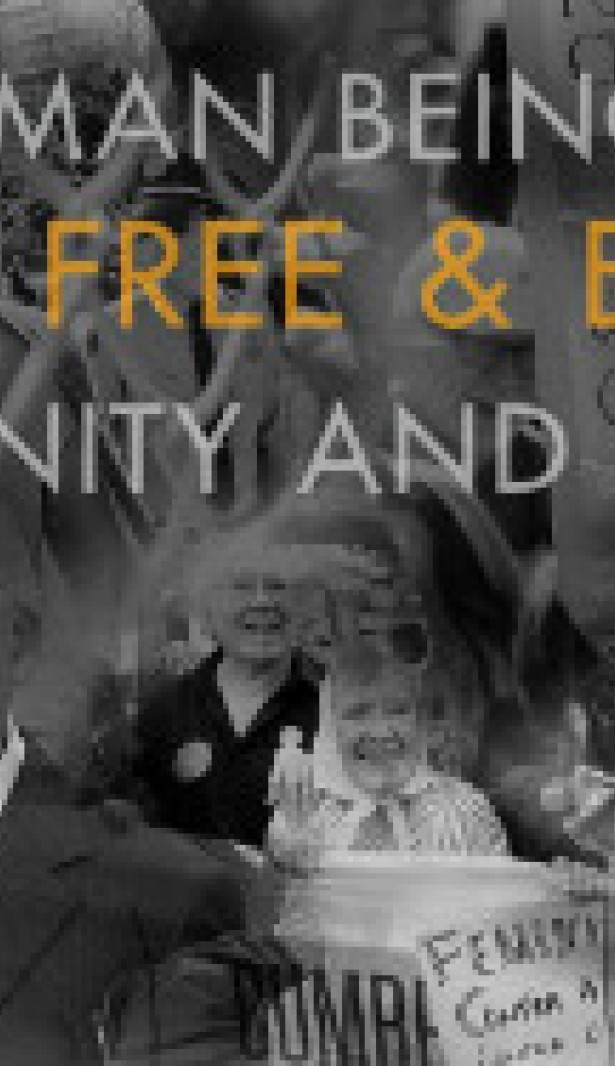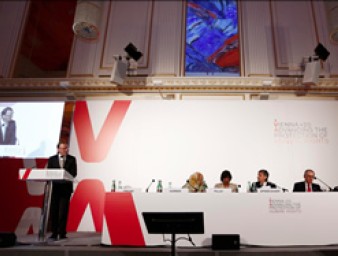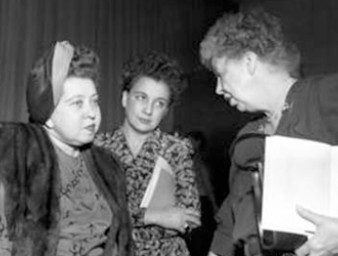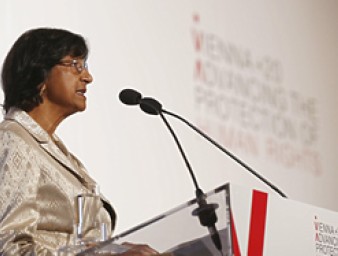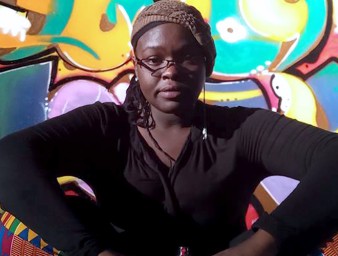Still powerful: UDHR at 70
11 December 2018
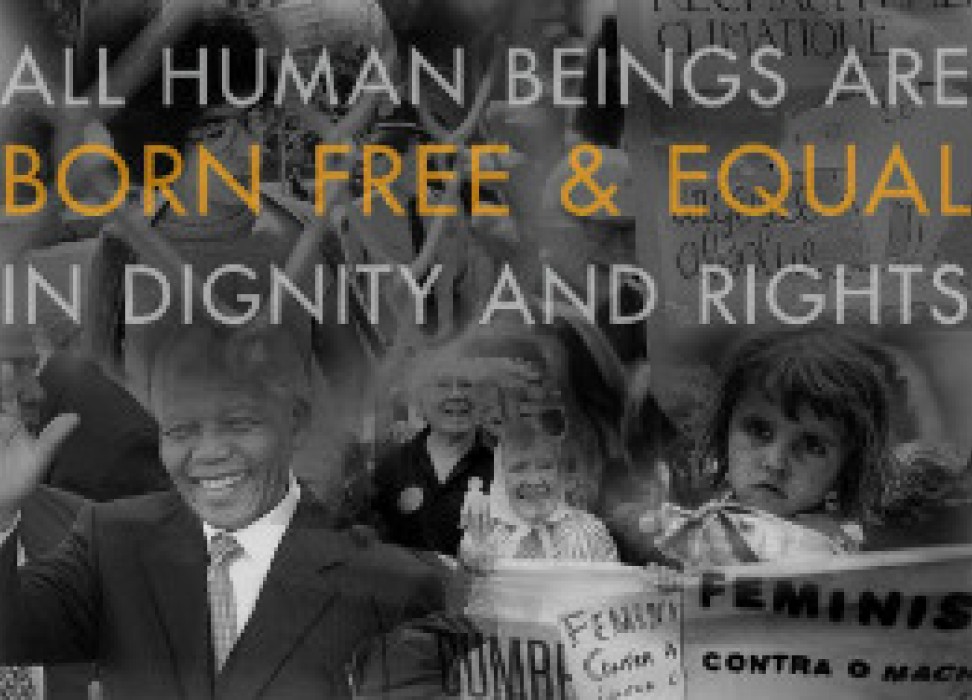
“The very idea that there should be a set of rights that all people have just by virtue of being human beings and all States should respect… is being questioned by leaders all over the world right now,” observed Sherine Tadros from Amnesty International, moderator of a panel discussion on the 70th anniversary of the adoption of the Universal Declaration of Human Rights, held on Human Rights Day 10 December 2018. “But worse than that, the idea is being portrayed as idealistic, naive and against national interests.”
Despite this negativism, the Universal Declaration remains lauded as the pivotal human rights standard whose principles have helped define the world we live in.
We cannot claim that human rights have been achieved and are respected everywhere, acknowledged Andrew Gilmour, Assistant Secretary-General for Human Rights. Indeed, “we are living in an era of backlash against the undeniable progress that has been made in the last 3 decades, up until now. Human rights defenders are denigrated, humiliated, harassed, put under surveillance, put in jail. Countries are passing laws to prevent human rights defenders from being able to do their work.”
Does this mean that the 70-year-old Declaration is no longer useful? When it was written, its drafters had no idea of the sorts of human rights challenges that might face the world 70 years later. Issues such as climate change, extreme inequality and digital space.
Can such a document tell us anything about how to handle the myriad of human rights issues created by new technologies, be it artificial intelligence, data privacy or manipulating social media for political or economic gain?
Yes, and quite a lot as it turns out, according to Brett Solomon, Executive Director of Access Now, an organization that defends and extends the digital rights of users at risk around the world.
By referring to the right to “seek, receive and impart information and ideas through any media and regardless of frontiers”, Article 19 of the Universal Declaration of human rights “actually did somehow anticipate the internet,” he observed. But unless the rights enshrined in the Declaration “are reinforced with code, encrypted with protocols, programed by laws and subject to transparency, the UDHR will continue to be hacked.”
It goes without saying that the rights that people have offline should be protected online, he said, drawing attention to the resolution of the Human Rights Council affirming this principle. But how do we do this when technology is up-ending long-term rules that have protected our rights? What does our right to privacy mean when we are monitored and spied upon relentlessly? How do we exercise our right to freedom of expression when the digital spaces we use are controlled by private companies or by repressive States? How do we ensure non-discrimination in the age of the algorithm when “online bias is baked into digital prejudice and where we have very little influence and almost no power to escape?”
It’s not just digital, economic and political rights that are at risk but also social, economic and cultural rights. Today, exercising our rights depends more and more on connectivity to the internet, said Brett Solomon. But what happens to the billions of people who are not connected, are forcibly disconnected or trapped behind firewalls?
It is the duty of the State to protect our rights, but country after country has failed us. For example, encryption, which is the modern-day pathway to privacy, is now illegal or being seriously undermined in dozens of countries. The so-called “securitization” of the internet is not actually making us safer, he said.
Companies are also responsible to protect our rights, Brett Solomon observed. Companies know more about their users than most sophisticated government security agencies, but who are the companies accountable to?
Addressing the human rights problems posed by new technologies requires a universal and multi-stakeholder approach, involving governments, international groups and organizations, tech companies and users themselves, he advised. To ensure new technology protects our rights as a rule and not as an exception, “the Universal Declaration of Human Rights has never been more important,” he declared.
“The principles of the Universal Declaration can also guide us as we deal with the existential threat to civilization of climate change,” observed Alex Loznak, a 21-year-old student from a farm in Oregon. Article 3, for example, guarantees the right to life, liberty and security of person. Article 25 provides the right to a standard of living for the health and well-being of every person. “All these rights are now infringed by climate chaos,” he said.
Alex Loznak believes that climate change is ‘inarguably’ one of the greatest threats facing his generation. With 21 other young people, he is taking action: in 2015 the group filed a case against the US federal government challenging its policies on climate change in an effort to make it more responsive to the concerns of future generations. He drew a parallel to the actions of young people in the Netherlands and Columbia who pursued human rights cases against their governments and secured judicial judgements requiring the government to take action to alleviate carbon emissions and deforestation. He sees hope in the activism of today’s young people who are forcing governments to listen to their concerns and take action to protect their right to a stable climate and healthy atmosphere.
For many millions of people today, their basic human right to dignity and equality guaranteed by the Universal Declaration, has been crushed by the seemingly intractable reality of extreme economic inequality. Forty-two people now own as much wealth as the poorest half of humanity – 3.7 billion people.
“Welcome to the economy of today,” said Nadia Daar, an advocate for social and economic justice with Oxfam International. It is “an economy with levels of wealth never seen before in human history and yet where 1 in every 9 [people] goes to bed hungry every night.” This is “the economy of the 1%” where last year two more billionaires were created each day and 82% of all new wealth created was captured by the 1% at the top while the bottom 50% got nothing.
“Don’t think that extreme wealth is harmless,” she warned. It comes with the ability of the super rich to buy elections, to buy impunity from justice, to buy media and to help ensure that their wealth keeps getting bigger by buying favorable laws. Africa alone loses $14 billion a year in tax contributions because of tax havens used by the super rich, she observed. Oxfam calculates that this is enough to pay for health care that would save the lives of 4 million children and employ enough teachers to get every African child into school.
This extreme inequality is not ‘normal’. It’s not that some people work really hard and others are ‘unlucky’. Nor is it inevitable. “This is man made. And I do mean man made,” she said. “Women bear the brunt of poverty and wage inequality… Economic and gender inequality are intricately connected and cannot be addressed in isolation.”
Inequality is not humanity’s inevitable fate. “We can make a different choice of policies to create the kind of economy we want to see.” Some governments are taking action. For example, South Korea has increased the minimum wage, is taxing rich corporations and individuals more and is spending that money on universal social protection. Senegal is 13th highest in the world in terms of the proportion of its budget spent on education. And in Iceland it is illegal to pay women less than men. “Fighting inequality is not some utopian ideal – these governments are already showing that a more human economy is possible and achievable,” observed Nadia Daar.
“The rights of the UDHR are not just aspirational. These are rights that we should all be guaranteed. We all deserve these rights,” she said, echoing the intentions of the drafters of the Universal Declaration of Human Rights from 70 years ago.
Despite this negativism, the Universal Declaration remains lauded as the pivotal human rights standard whose principles have helped define the world we live in.
We cannot claim that human rights have been achieved and are respected everywhere, acknowledged Andrew Gilmour, Assistant Secretary-General for Human Rights. Indeed, “we are living in an era of backlash against the undeniable progress that has been made in the last 3 decades, up until now. Human rights defenders are denigrated, humiliated, harassed, put under surveillance, put in jail. Countries are passing laws to prevent human rights defenders from being able to do their work.”
Does this mean that the 70-year-old Declaration is no longer useful? When it was written, its drafters had no idea of the sorts of human rights challenges that might face the world 70 years later. Issues such as climate change, extreme inequality and digital space.
Can such a document tell us anything about how to handle the myriad of human rights issues created by new technologies, be it artificial intelligence, data privacy or manipulating social media for political or economic gain?
Yes, and quite a lot as it turns out, according to Brett Solomon, Executive Director of Access Now, an organization that defends and extends the digital rights of users at risk around the world.
By referring to the right to “seek, receive and impart information and ideas through any media and regardless of frontiers”, Article 19 of the Universal Declaration of human rights “actually did somehow anticipate the internet,” he observed. But unless the rights enshrined in the Declaration “are reinforced with code, encrypted with protocols, programed by laws and subject to transparency, the UDHR will continue to be hacked.”
It goes without saying that the rights that people have offline should be protected online, he said, drawing attention to the resolution of the Human Rights Council affirming this principle. But how do we do this when technology is up-ending long-term rules that have protected our rights? What does our right to privacy mean when we are monitored and spied upon relentlessly? How do we exercise our right to freedom of expression when the digital spaces we use are controlled by private companies or by repressive States? How do we ensure non-discrimination in the age of the algorithm when “online bias is baked into digital prejudice and where we have very little influence and almost no power to escape?”
It’s not just digital, economic and political rights that are at risk but also social, economic and cultural rights. Today, exercising our rights depends more and more on connectivity to the internet, said Brett Solomon. But what happens to the billions of people who are not connected, are forcibly disconnected or trapped behind firewalls?
It is the duty of the State to protect our rights, but country after country has failed us. For example, encryption, which is the modern-day pathway to privacy, is now illegal or being seriously undermined in dozens of countries. The so-called “securitization” of the internet is not actually making us safer, he said.
Companies are also responsible to protect our rights, Brett Solomon observed. Companies know more about their users than most sophisticated government security agencies, but who are the companies accountable to?
Addressing the human rights problems posed by new technologies requires a universal and multi-stakeholder approach, involving governments, international groups and organizations, tech companies and users themselves, he advised. To ensure new technology protects our rights as a rule and not as an exception, “the Universal Declaration of Human Rights has never been more important,” he declared.
“The principles of the Universal Declaration can also guide us as we deal with the existential threat to civilization of climate change,” observed Alex Loznak, a 21-year-old student from a farm in Oregon. Article 3, for example, guarantees the right to life, liberty and security of person. Article 25 provides the right to a standard of living for the health and well-being of every person. “All these rights are now infringed by climate chaos,” he said.
Alex Loznak believes that climate change is ‘inarguably’ one of the greatest threats facing his generation. With 21 other young people, he is taking action: in 2015 the group filed a case against the US federal government challenging its policies on climate change in an effort to make it more responsive to the concerns of future generations. He drew a parallel to the actions of young people in the Netherlands and Columbia who pursued human rights cases against their governments and secured judicial judgements requiring the government to take action to alleviate carbon emissions and deforestation. He sees hope in the activism of today’s young people who are forcing governments to listen to their concerns and take action to protect their right to a stable climate and healthy atmosphere.
For many millions of people today, their basic human right to dignity and equality guaranteed by the Universal Declaration, has been crushed by the seemingly intractable reality of extreme economic inequality. Forty-two people now own as much wealth as the poorest half of humanity – 3.7 billion people.
“Welcome to the economy of today,” said Nadia Daar, an advocate for social and economic justice with Oxfam International. It is “an economy with levels of wealth never seen before in human history and yet where 1 in every 9 [people] goes to bed hungry every night.” This is “the economy of the 1%” where last year two more billionaires were created each day and 82% of all new wealth created was captured by the 1% at the top while the bottom 50% got nothing.
“Don’t think that extreme wealth is harmless,” she warned. It comes with the ability of the super rich to buy elections, to buy impunity from justice, to buy media and to help ensure that their wealth keeps getting bigger by buying favorable laws. Africa alone loses $14 billion a year in tax contributions because of tax havens used by the super rich, she observed. Oxfam calculates that this is enough to pay for health care that would save the lives of 4 million children and employ enough teachers to get every African child into school.
This extreme inequality is not ‘normal’. It’s not that some people work really hard and others are ‘unlucky’. Nor is it inevitable. “This is man made. And I do mean man made,” she said. “Women bear the brunt of poverty and wage inequality… Economic and gender inequality are intricately connected and cannot be addressed in isolation.”
Inequality is not humanity’s inevitable fate. “We can make a different choice of policies to create the kind of economy we want to see.” Some governments are taking action. For example, South Korea has increased the minimum wage, is taxing rich corporations and individuals more and is spending that money on universal social protection. Senegal is 13th highest in the world in terms of the proportion of its budget spent on education. And in Iceland it is illegal to pay women less than men. “Fighting inequality is not some utopian ideal – these governments are already showing that a more human economy is possible and achievable,” observed Nadia Daar.
“The rights of the UDHR are not just aspirational. These are rights that we should all be guaranteed. We all deserve these rights,” she said, echoing the intentions of the drafters of the Universal Declaration of Human Rights from 70 years ago.
